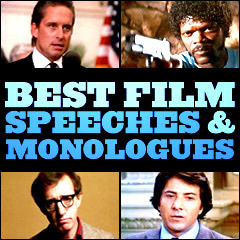|
Best Film Speeches and Monologues
|
|
Title Screen
|
Film Title/Year and Description of Film Speech/Monologue |
Screenshots
|

|
Be Cool (2005)
Screenwriter(s): Peter Steinfeld
 "Have
You Lost Your Mind?" "Have
You Lost Your Mind?"
Gangster/record producer Sin LaSalle (Cedric
the Entertainer) pointed a gun at Russian Mafia head Roman
Bulkin (Alex Kubik) who offensively used the racist N-word,
as he spouted off on all the positive contributions of African-Americans
to culture and society:
Have you lost your mind? I mean, how is it
that you can disrespect a man's ethnicity when you know
we've influenced nearly every facet of white America. From
our music to our style of dress, not to mention your basic
imitation of our sense of cool - walk, talk, dress, mannerisms.
We enrich your very existence, all the while contributing
to the gross national product through our achievements
in corporate America.
It's these conceits that comfort me when I'm
faced with the ignorant, cowardly, bitter and bigoted who have no
talent, no guts. People like you who desecrate things they
don't understand when the truth is you should say 'Thank
you, man,' and go on about your way. But, apparently, you're
incapable of doing that, so -- (he shot the man in the
chest)...And don't tell me to be cool. I am cool! (Sin
shot the man a second time) Racial epithets. Why does
it always come down to that? Makes me sad for my daughter.
|

|
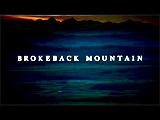
|
Brokeback Mountain (2005)
Screenwriter(s): Larry McMurtry, Diana Ossana
 "I
Wish I Knew How to Quit You" "I
Wish I Knew How to Quit You"
Play clip (excerpt): 
Play clip (excerpt): 
At the end of a fishing trip together, rodeo
cowboy Jack Twist (Jake Gyllenhaal) was speaking to his gay
lover ranch-hand Ennis del Mar (Heath Ledger) - the two had
fallen in love at Brokeback Mountain (Wyoming) years earlier
in 1963. Ennis dealt harshly with his former lover:
I'm gonna tell you this one time, Jack f--kin'
Twist, an' I ain't foolin'. What I don't know - all them
things that I don't know - could get you killed if I come
to know them. I ain't jokin'.
Twist responded that he was sexually frustrated
that they weren't seeing each other very much:
Well, try this one and I'll say it just once....Tell
you what, we could've had a good life together! F--kin'
real good life! Had us a place of our own. But you didn't
want it, Ennis! So what we got now is Brokeback Mountain!
Everything's built on that! That's all we got, boy, f--kin'
all. So I hope you know that, even if you don't never know
the rest! You count the damn few times that we have been
together in nearly twenty years and you measure the short
f--kin' leash you keep me on - and then you ask me about
Mexico and you tell me you'll kill me for needing somethin'
that I don't hardly never get. You have no idea how bad
it gets! And I'm not you - I can't make it on a coupla
high-altitude f--ks once or twice a year! You are too much
for me, Ennis, you sonofawhoreson bitch! I wish I knew
how to quit you.
Ennis responded, while crying, telling Jack that
he was the source of his conflicted emotions:
Well, why don't you? Why don't you just let
me be? It's because of you, Jack, that I'm like this! I'm
nothin'... I'm nowhere... Get the f--k off me!.. (They
struggled against each other, and ended up embracing)
I can't stand it any more, Jack.
|
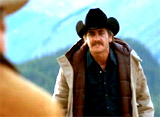
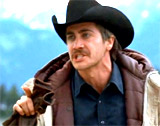
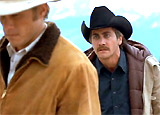
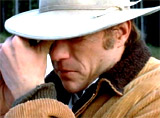
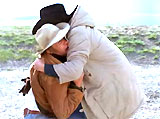
|

|
The Girl in the Cafe
(2005, UK) (TV)
Screenwriter(s): Richard Curtis
 Response
to the British Prime Minister's Dinner Speech at G8 Summit: "That's
Not True!" Response
to the British Prime Minister's Dinner Speech at G8 Summit: "That's
Not True!"
Play clip (excerpt): 
Free-spirited, idealistic, undiplomatic young
female Gina (Kelly Macdonald) contradicted the Prime Minister's
(Corin Redgrave) assertion, during a dinner speech at the G8
Economic Summit in Reykjavik, Iceland that they were effectively
combating the "extreme curses of poverty" in the
world.
She accused them of "ignoring the poor" by
denying enormous financial aid - and reflected how she would
probably be thrown out for "heckling" - so she opted
to immediately speak out about the issue:
That's not true. That's not true...What
are the traditions, then? Well crafted compromise and just
sort of ignoring the poor?...I doubt it. I imagine I'll
be thrown out later so it's probably got to be now. I don't
know how much the rest of you ladies know about what's
going on, but my friend here tells me that while we are
eating, a hundred million children are nearly starving.
There's just millions of kids who'd kill for the amount
of food that fat old me left on the side of my plate -
children who are then so weak they'll die if a mosquito
bites them. And so, they do die, one every three seconds.
[She snapped her fingers]
There they go. And another one.
Anyone who has kids knows that every mother
and father in Africa must love their children as much as
they do. And to watch your kids die, to watch them
die and then to die yourself in trying to protect them -
that's not right. And tomorrow, eight of the men sitting
'round this table actually have the ability to sort this
out by making a few great decisions. And if they don't, someday,
someone else will, and they'll look back on us lot and say:
'People were actually dying in their millions unnecessarily,
in front of you, on your TV screens. What were you thinking?
You knew what to do to stop it happening and you didn't do
those things. Shame on you.'
So that's what you have to do tomorrow. Be
great, instead of being ashamed. It can't be impossible.
It must be possible...
|

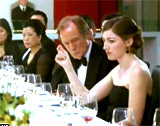
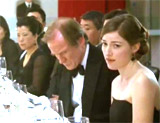
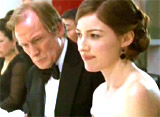
|
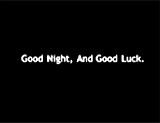
|
Good Night, and Good
Luck. (2005)
Screenwriter(s): George Clooney, Grant Heslov
 Murrow's
Attack on Senator McCarthy, and his Support of Freedom of
Speech Murrow's
Attack on Senator McCarthy, and his Support of Freedom of
Speech
In a powerful speech spoken directly into the
camera on his television show See It Now, legendary
reporter Edward R. Murrow (David Strathairn) attacked Wisconsin
Sen. Joseph R. McCarthy's (Himself) methods:
No one familiar with the history of his
country, can deny that congressional committees are useful.
It is necessary to investigate before legislating. But
the line between investigating and persecuting is a very
fine one, and the Junior Senator from Wisconsin has stepped
over it repeatedly. His primary achievement has been confusing
the public mind as between the internal and the external
threats of communism. We must not confuse dissent with
disloyalty. We must remember always that accusation is
not proof, and that conviction depends upon evidence and
due process of law. We will not walk in fear one of another.
We will not be driven by fear into an age of unreason if
we dig deep in our history and our doctrine. And remember
that we are not descended from fearful men. Not from men
who feared to write, to associate, to speak and to defend
the causes that were, for the moment, unpopular.
This is no time for men who oppose Sen. McCarthy's
methods to keep silent or for those who approve. We can deny
our heritage and our history but we cannot escape responsibility
for the results. We proclaim ourselves, indeed we are, the
defenders of freedom wherever it continues to exist in the
world. But we cannot defend freedom abroad by deserting it
at home.
The actions of the Junior Senator from Wisconsin
have caused alarm and dismay amongst our allies abroad and
given considerable comfort to our enemies. And whose fault
is that? Not really his. He didn't create this situation
of fear -- he merely exploited it, and rather successfully.
Cassius was right: the fault, dear Brutus, is not in our
stars, but in ourselves. Good night, and good luck.
|

|

|
Good Night, and Good
Luck. (2005)
Screenwriter(s): George Clooney, Grant Heslov
 "What
is Happening to Radio and Television" "What
is Happening to Radio and Television"
Play clip (excerpt): 
Edward R. Murrow (David Strathairn) also delivered
a speech on October 25, 1958, to RTNDA (Radio-Television News
Directors Association) - news professionals who were honoring
his notable career, about the positive good of television:
This might just do nobody any good. At the
end of this discourse, a few people may accuse this reporter
of fouling his own comfortable nest, and your organization
may be accused of having given hospitality to heretical
and even dangerous ideas. But the elaborate structure of
networks, advertising agencies, and sponsors will not be
shaken or altered. It is my desire if not my duty to try
to talk to you journeymen with some candor about what is
happening to radio and television, and if what I say is
responsible, I alone am responsible for the saying of it.
Our history will be what we make of it. And
if there are any historians about fifty or a hundred years
from now, and there should be preserved the kinescopes of
one week of all three networks, they will there find, recorded
in black and white and in color, evidence of decadence, escapism,
and insulation from the realities of the world in which we
live. We are currently wealthy, fat, comfortable, and complacent.
We have a built-in allergy to unpleasant or disturbing information
- our mass media reflect this. But unless we get up off our
fat surpluses, and recognize that television, in the main,
is being used to distract, delude, amuse, and insulate us,
then television and those who finance it, those who look
at it, and those who work at it, may see a totally different
picture, too late.
|


|

|
Good Night, and Good
Luck. (2005)
Screenwriter(s): George Clooney, Grant Heslov
 "It
is Merely Wires and Lights in a Box" "It
is Merely Wires and Lights in a Box"
Play clip (excerpt): 
The film concluded with the second part of Murrow's
(David Strathairn) speech to the news professionals:
...I began by saying that our history will
be what we make it. If we go on as we are, then history
will take its revenge and retribution will not limp in
catching up with us. Just once in awhile, let us exalt
the importance of ideas and information. Let us dream to
the extent of saying that on a given Sunday night, a time
normally occupied by Ed Sullivan, is given over to a clinical
survey on the state of American education. And a week or
two later, a time normally used by Steve Allen, is devoted
to a thorough-going study of American policy in the Middle
East. Would the corporate image of their respective sponsors
be damaged? Would the shareholders rise up in their wrath
and complain? Would anything happen, other than a few million
people would have received a little illumination on subjects
that may well determine the future of this country - and
therefore the future of the corporations?
To those who say people wouldn't look, they
wouldn't be interested, they're too complacent, indifferent
and insulated, I can only reply -- there is, in one reporter's
opinion, considerable evidence against that contention. But
even if they are right, what have they got to lose?
Because if they are right, and this instrument is
good for nothing but to entertain, amuse and insulate, then
the tube is flickering now and we will soon see that the
whole struggle is lost. This instrument can teach, it can
illuminate - and yes, it can even inspire. But it can do
so only to the extent that humans are determined to use it
towards those ends. Otherwise, it is merely wires and lights
in a box. Good night, and good luck.
|


|
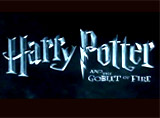
|
Harry
Potter and the Goblet of Fire (2005)
Screenwriter(s): Steve Kloves
 Challenging
The Boy-Who-Lived Challenging
The Boy-Who-Lived
The resurrected Dark Lord Voldemort (Ralph Fiennes)
confronted his long-time famous nemesis Harry Potter (Daniel
Radcliffe), "the boy who lived." He spoke of the
legend of Harry's parents' death that occurred thirteen years
earlier, when he truly lost his powers, due to the protective
sacrifice of Harry's "dear sweet" mother Lily:
Harry. I'd almost forgotten you were here.
Standing on the bones of my father. Yeah. I'd introduce
you, but word has it you're almost as famous as me these
days. The Boy-Who-Lived. How lies have fed your legend,
Harry! Shall I reveal what really happened that night 13
years ago? Shall I divulge how I truly lost my powers?
Yes, shall I. It was love. You see, when dear, sweet Lily
Potter gave her life for her only son, she provided the
ultimate protection. I could not touch him. It was old
magic. Something I should have foreseen. But no matter,
no matter. Things have changed. I CAN TOUCH YOU NOW!
(He placed the pad of his finger on Harry's forehead
lightning bolt scar, and Harry immediately screamed out in
agony)
Yeah! Astonishing what a few drops of your blood will do,
eh, Harry?
Voldemort challenged Harry to a duel of wills
and wands and threatened death:
Pick up your wand, Potter! I said, pick
it up. Get up! Get up! You've been taught how to duel,
I presume, yes? First, we bow to each other. Come on now,
Harry. The niceties must be observed. Dumbledore wouldn't
want you to forget your manners, would he? I said, BOW!
That's better, and now: Crucio! Crucio! Attaboy,
Harry! Your parents would be proud. Especially your filthy
Muggle mother...I'm going to kill you, Harry Potter. I'm
going to destroy you. After tonight, no one will ever again
question my powers. After tonight, if they speak of you,
they'll speak only of how you begged for death. And I,
being a merciful Lord, obliged. Get up ! Don't you turn
your back on me, Harry Potter! I want you to look at me
when I kill you. I want to see the light leave your eyes.
|
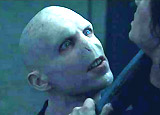
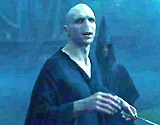
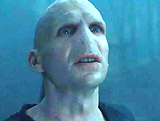
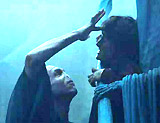
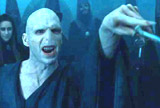
|

|
The Hitchhiker's Guide
to the Galaxy (2005)
Screenwriter(s): Douglas Adams, Karey Kirkpatrick
 Sperm
Whale and Bowl of Petunias Ruminations Sperm
Whale and Bowl of Petunias Ruminations
The humorous speech by The Hitchhiker's Guide
to the Galaxy - known as the Book, the Narrator or The Guide
(voice of Stephen Fry) regarding how the orbiting spaceship Heart
of Gold, powered by the Infinite Probability Drive, suddenly
transformed two nuclear missiles into a giant sperm whale and
a bowl of petunias.
As the sperm whale fell out of orbit through
the Magrathean atmosphere toward the alien planet, its thought
processes were described:
It is important to note that suddenly, and
against all probability, a sperm whale had been called
into existence, several miles above the surface of an alien
planet. But since this is not a naturally tenable position
for a whale, this innocent creature had very little time
to come to terms with its identity. This is what it thought
as it fell: 'Ahhh! Whoa! What's happening? Who am I? Why
am I here? What's my purpose in life? What do I mean by
'who am I'? Okay, okay, calm down, calm down, get a grip
now. Ooh, this is an interesting sensation. What is it?
It's a sort of a tingling in my... well, I suppose I better
start finding names for things. Let's call it a... tail!
Yeah! Tail! And hey, what's this roaring sound, whooshing
past what I'm suddenly gonna call my head? Wind! Is that
a good name? It'll do. Yeah, this is really exciting! I'm
dizzy with anticipation! Or is it the wind? There's an
awful lot of that now, isn't it? And what's this thing
coming toward me very fast? So big and flat and round,
it needs a big wide sounding name like 'Ow', 'Ownge', 'Round',
'Ground'! That's it! Ground! Ha! I wonder if it'll be friends
with me? Hello Ground!'
The sperm whale crashed into the ground, viewed
from a distance with a rising plume of ice/snow.
Curiously, the only thing that went through
the mind of the bowl of petunias as it fell, was: 'Oh no,
not again.' Many have speculated that if we knew exactly why the
bowl of petunias had thought that, we should know a lot
more about the nature of the universe than we do now.
|


|
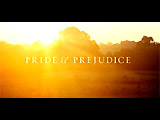
|
Pride & Prejudice (2005,
UK)
Screenwriter(s): Deborah Moggach
 "I
Never Wish to Be Parted From You From This Day On" -
A Statement of Love "I
Never Wish to Be Parted From You From This Day On" -
A Statement of Love
Reluctant at first to fall in love with spirited,
lower-ranked Elizabeth Bennet (Keira Knightley), the arrogant
and conceited Mr. Darcy (Matthew MacFadyen) - for the second
time - declared his love to her on the moors at dawn:
You must know, surely you must know, it was
all for you. You are too generous to trifle with me. I
believe you spoke with my aunt last night, and it has taught
me to hope as I'd scarcely allowed myself before. If your
feelings are still what they were last April, tell me so
at once. My affections and wishes have not changed, but
one word from you will silence me forever. If, however,
your feelings have changed, I will have to tell you: you
have bewitched me, body and soul, and I love, I love, I
love you. I never wish to be parted from you from this
day on.
|
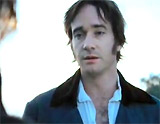
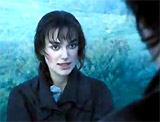
|
